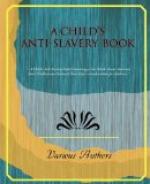Then turning to Hasty, whose feeble nerves had been intensely excited by this scene, she said: “I want you to get to work again pretty soon, and not lie there too lazy to work. You need not think I am going to lose my money by your foolishness. I shall expect your month’s payment as usual, and if I don’t get it, I will hire you out like the rest. And there is another thing I have to say; you are not going to keep this lazy girl here to hinder you, and to spend money on. A lady I know wants just such a girl to go to the door, and to wait on her, who will give me two dollars a month for her, and it is quite time she was doing something. I will not take her away now, but next week do you tidy her up and send her to me.”
CHAPTER V.
Hasty was dying. She knew that it was to be so. For herself it was a release which she hailed gladly; but the thought of leaving her child rent her heart with anguish. She could see what the lot of that poor waif of childhood, cast upon the sea of Southern despotism, would be, and she longed to protect her from it. Yet what is a slave mother’s protection to her child? What blow can she arrest? What temptation avert? None. Even a mother’s claim is unrecognized, and the child’s affection unregarded. Hasty’s strength gradually declined until Sunday, when, feeling that death was near, she sent Fanny for Mrs. Jennings, for the purpose of bidding her farewell, and asking her protection for her daughter. Mrs. Jennings, on learning from Fanny the condition of Hasty, immediately complied with the request. On entering the room she was surprised and shocked at the ravages that mental and bodily suffering had made on the once handsome woman. Seating herself by the bedside, Mrs. Jennings inquired in what way she could ease the mind of the dying mother. With earnestness did Hasty plead that her child might be rescued from her present condition. She entreated Mrs. Jennings to buy Fanny from Mrs. Le Rue, and bring her up in the fear of God, and beyond the reach of a slave girl’s perils.
All this Mrs. Jennings promised, and with many a word of comfort she smoothed the passing of the immortal spirit into the unknown country. She pointed to the Saviour, and told of his wondrous love, of the equality of all in his sight, and of the saving power of his grace extended to all, whether bond or free.
Just as the sun threw his last rays upon the spires of the city, Hasty’s spirit was released, and she was free. Fanny gave herself up to a child’s grief, and refused to be comforted. To the slave, the affections are the bright spots in his wilderness of sorrow and care; and as an Arab loves the oasis the better that it is in the midst of the desert, so the slave centers the whole strength of his nature in his loved ones, the more so that he is shut out from the hopes of wealth, the longings of ambition, and the excitements of a freeman’s life.




